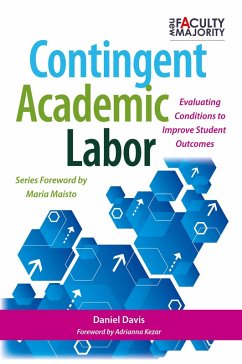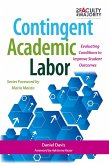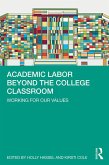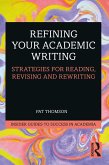Daniel B. Davis
Contingent Academic Labor (eBook, PDF)
Evaluating Conditions to Improve Student Outcomes
26,95 €
26,95 €
inkl. MwSt.
Sofort per Download lieferbar

13 °P sammeln
26,95 €
Als Download kaufen

26,95 €
inkl. MwSt.
Sofort per Download lieferbar

13 °P sammeln
Jetzt verschenken
Alle Infos zum eBook verschenken
26,95 €
inkl. MwSt.
Sofort per Download lieferbar
Alle Infos zum eBook verschenken

13 °P sammeln
Daniel B. Davis
Contingent Academic Labor (eBook, PDF)
Evaluating Conditions to Improve Student Outcomes
- Format: PDF
- Merkliste
- Auf die Merkliste
- Bewerten Bewerten
- Teilen
- Produkt teilen
- Produkterinnerung
- Produkterinnerung

Bitte loggen Sie sich zunächst in Ihr Kundenkonto ein oder registrieren Sie sich bei
bücher.de, um das eBook-Abo tolino select nutzen zu können.
Hier können Sie sich einloggen
Hier können Sie sich einloggen
Sie sind bereits eingeloggt. Klicken Sie auf 2. tolino select Abo, um fortzufahren.

Bitte loggen Sie sich zunächst in Ihr Kundenkonto ein oder registrieren Sie sich bei bücher.de, um das eBook-Abo tolino select nutzen zu können.
This book will be useful for administrators and labor organizers alike in assessing the degree of exploitation, or empowerment, in their own institution.
- Geräte: PC
- ohne Kopierschutz
- eBook Hilfe
- Größe: 2.72MB
Andere Kunden interessierten sich auch für
![Contingent Academic Labor (eBook, ePUB) Contingent Academic Labor (eBook, ePUB)]() Daniel B. DavisContingent Academic Labor (eBook, ePUB)26,95 €
Daniel B. DavisContingent Academic Labor (eBook, ePUB)26,95 €![Academic Labor Beyond the College Classroom (eBook, PDF) Academic Labor Beyond the College Classroom (eBook, PDF)]() Academic Labor Beyond the College Classroom (eBook, PDF)41,95 €
Academic Labor Beyond the College Classroom (eBook, PDF)41,95 €![Refining Your Academic Writing (eBook, PDF) Refining Your Academic Writing (eBook, PDF)]() Pat ThomsonRefining Your Academic Writing (eBook, PDF)20,95 €
Pat ThomsonRefining Your Academic Writing (eBook, PDF)20,95 €![Designing Effective Teaching and Significant Learning (eBook, PDF) Designing Effective Teaching and Significant Learning (eBook, PDF)]() Zala FashantDesigning Effective Teaching and Significant Learning (eBook, PDF)33,95 €
Zala FashantDesigning Effective Teaching and Significant Learning (eBook, PDF)33,95 €- -22%11
![Agilität in der Schulentwicklung (eBook, PDF) Agilität in der Schulentwicklung (eBook, PDF)]() Agilität in der Schulentwicklung (eBook, PDF)69,99 €
Agilität in der Schulentwicklung (eBook, PDF)69,99 € ![Thrive Online (eBook, PDF) Thrive Online (eBook, PDF)]() Shannon RiggsThrive Online (eBook, PDF)26,95 €
Shannon RiggsThrive Online (eBook, PDF)26,95 €![Doctoral Research Supervision, Pedagogy and the PhD (eBook, PDF) Doctoral Research Supervision, Pedagogy and the PhD (eBook, PDF)]() Bill GreenDoctoral Research Supervision, Pedagogy and the PhD (eBook, PDF)40,95 €
Bill GreenDoctoral Research Supervision, Pedagogy and the PhD (eBook, PDF)40,95 €-
-
-
This book will be useful for administrators and labor organizers alike in assessing the degree of exploitation, or empowerment, in their own institution.
Dieser Download kann aus rechtlichen Gründen nur mit Rechnungsadresse in A, B, BG, CY, CZ, D, DK, EW, E, FIN, F, GR, HR, H, IRL, I, LT, L, LR, M, NL, PL, P, R, S, SLO, SK ausgeliefert werden.
Produktdetails
- Produktdetails
- Verlag: Taylor & Francis eBooks
- Seitenzahl: 136
- Erscheinungstermin: 3. Juli 2023
- Englisch
- ISBN-13: 9781000973532
- Artikelnr.: 68356851
- Verlag: Taylor & Francis eBooks
- Seitenzahl: 136
- Erscheinungstermin: 3. Juli 2023
- Englisch
- ISBN-13: 9781000973532
- Artikelnr.: 68356851
- Herstellerkennzeichnung Die Herstellerinformationen sind derzeit nicht verfügbar.
Daniel B. Davis is a PhD candidate in sociology at the University of California, San Diego; a Kauffman Foundation Dissertation Fellow; half-time faculty at Point Loma Nazarene University and a lecturer at San Diego State University. He has published articles on student college-to-career pathways in Sociology of Education and Research in the Sociology of Organizations. Davis previously researched undergraduate educational outcomes with CREATE (The Center for Research on Educational Equity, Assessment and Teaching Excellence) at UC San Diego. He has taught dozens of college courses in various settings, including private and public, community colleges and four-year universities, online and face-to-face. Across these institutions, the range of working and learning conditions Davis encountered was vast, with the highest-paying campus offering compensation four times greater than the lowest-paying institution. Some of the positions had benefits and reasonable security of contract; others had neither. The sense of professional inclusion-through designated office space, invitations to department events, and more-was substantial at certain campuses and non-existent at others. It was the experience of these disparate working conditions, their impact on Davis' sense of professional engagement, and their effect on his students that motivated him to write this guide. Click here to visit Daniel's professional website. Adrianna Kezar is a professor of higher education at the University of Southern California and codirector of the Pullias Center for Higher Education. Kezar is a national expert of student success, equity and diversity, the changing faculty, change, governance, and leadership in higher education. Kezar is well published with 18 books and monographs, more than 100 journal articles, and more than 100 book chapters and reports. Recent books include Envisioning the Faculty of the 21st Century (Rutgers University Press, 2016), How Colleges Change (Routledge, 2013
Introduction Part I. Contingent Academic Labor in Broader Contexts 1.
Contingent Faculty amid National Labor Trends 2. The Influence of
Contingent Faculty on Student Outcomes 3. The "Cooling-Out Function" on
Contingent Faculty Part II. Illustrating the Range of Work Conditions 4.
Material Equity. Pay Parity, Job Security, and Benefits 5. Professional
Equity. Opportunities for Development and Advancement 6. Social Equity.
Faculty Diversity and Inclusivity by Race and Gender Part III. The
Contingent Labor Conditions Scorecard 7. Introducing the Contingent Labor
Conditions (CLC. Scorecard 8. Calculating the Contingent Labor Conditions
(CLC. Scorecard Conclusion References Appendix. Contingent Labor Conditions
(CLC. Scorecard Blank Forms
Contingent Faculty amid National Labor Trends 2. The Influence of
Contingent Faculty on Student Outcomes 3. The "Cooling-Out Function" on
Contingent Faculty Part II. Illustrating the Range of Work Conditions 4.
Material Equity. Pay Parity, Job Security, and Benefits 5. Professional
Equity. Opportunities for Development and Advancement 6. Social Equity.
Faculty Diversity and Inclusivity by Race and Gender Part III. The
Contingent Labor Conditions Scorecard 7. Introducing the Contingent Labor
Conditions (CLC. Scorecard 8. Calculating the Contingent Labor Conditions
(CLC. Scorecard Conclusion References Appendix. Contingent Labor Conditions
(CLC. Scorecard Blank Forms
Introduction Part I. Contingent Academic Labor in Broader Contexts 1.
Contingent Faculty amid National Labor Trends 2. The Influence of
Contingent Faculty on Student Outcomes 3. The "Cooling-Out Function" on
Contingent Faculty Part II. Illustrating the Range of Work Conditions 4.
Material Equity. Pay Parity, Job Security, and Benefits 5. Professional
Equity. Opportunities for Development and Advancement 6. Social Equity.
Faculty Diversity and Inclusivity by Race and Gender Part III. The
Contingent Labor Conditions Scorecard 7. Introducing the Contingent Labor
Conditions (CLC. Scorecard 8. Calculating the Contingent Labor Conditions
(CLC. Scorecard Conclusion References Appendix. Contingent Labor Conditions
(CLC. Scorecard Blank Forms
Contingent Faculty amid National Labor Trends 2. The Influence of
Contingent Faculty on Student Outcomes 3. The "Cooling-Out Function" on
Contingent Faculty Part II. Illustrating the Range of Work Conditions 4.
Material Equity. Pay Parity, Job Security, and Benefits 5. Professional
Equity. Opportunities for Development and Advancement 6. Social Equity.
Faculty Diversity and Inclusivity by Race and Gender Part III. The
Contingent Labor Conditions Scorecard 7. Introducing the Contingent Labor
Conditions (CLC. Scorecard 8. Calculating the Contingent Labor Conditions
(CLC. Scorecard Conclusion References Appendix. Contingent Labor Conditions
(CLC. Scorecard Blank Forms







